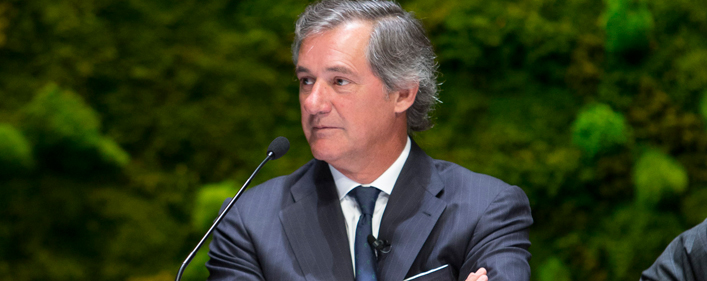- Speaking at the Innovate4Climate forum, held under the auspices of the World Bank, ACCIONA's Executive Chairman called for the economy to be electrified and advocated a larger contribution by renewables in the energy mix as means of accelerating the global process of decarbonisation.
- The company has reduced its emission by 43% in the last five years through its Sustainability Master Plan.

José Manuel Entrecanales, executive chairman of ACCIONA, said that 'meaningful carbon pricing is vital if we are to achieve a clean economy'. Entrecanales advocated accelerating the electrification of the economy and called for renewables to account for a growing share of the energy mix as key means of making decisive progress in the process of decarbonisation.
Speaking today at the Innovate4Climate meeting in Barcelona, held under the auspices of the World Bank, where global leaders from the public and private sectors are analysing the investments required to achieve the goals of the Paris Agreement, ACCIONA's executive chairman said that the price of CO2 emissions should be 'substantially higher' than at present in order to keep global warming below 2ºC.
To contribute to that goal, ACCIONA has become the first carbon neutral company in the Utilities sector of the 2016 Dow Jones Sustainability Indexes (DJSI), thereby fulfilling the commitment that José Manuel Entrecanales announced at the Paris Climate Summit in December 2015.
As a result, ACCIONA is a pioneer among the world's most sustainable companies in what is a crucial policy for combating climate change.
Sustainability Plan
ACCIONA, a global infrastructure and energy group that employs close to 33,000 people in over 40 countries and obtains nearly 6 billion euros in annual revenues, is now carbon neutral, having reduced its greenhouse gas emissions by 43% through its Sustainability Master Plan 2010-2015. As a result, ACCIONA's greenhouse gas emissions were reduced to 817,200 tons in 2016, which the company offset by acquiring Certified Emission Reductions from wind projects in Mexico under the United Nations Framework Convention on Climate Change (UNFCCC).
Carbon neutrality entails pricing greenhouse gas emissions; this gives the various business areas an incentive to reduce emissions in subsequent years, implement efficiency measures and purchase green energy.
ACCIONA's Sustainability Master Plan 2020 seeks to continue with the process of decarbonising the company's business model by expanding the sources of clean energy (particularly at desalination plants), transitioning to less-polluting fuels and working with suppliers to reduce emissions.
To determine its carbon footprint, ACCIONA keeps records of all its scope I and II greenhouse gas emissions, in line with the Greenhouse Gas Protocol; this includes all direct emissions produced by the company's operations and the indirect emissions produced by the acquisition and consumption of electricity, steam, heating and cooling.
This milestone places ACCIONA alongside such companies as Microsoft and Marks&Spencer, which are the first companies in the world to achieve carbon neutrality; ACCIONA is the first utility in the 2016 Dow Jones Sustainability Index (DJSI) to do so, as part of its commitment to contribute to the transition towards a low-carbon economy.
Ambitious goals
According to the Carbon Disclosure Project, leading multinationals must adopt more ambitious goals, such as halving their carbon emissions, in order to keep global warming below 2 degrees, in line with calls by the scientific community and multilateral bodies.
ACCIONA is the world's largest renewables-only electric utility, with 9 GW of operational capacity that can cover the electricity needs of the equivalent of 6 million households; it has always been to the forefront in advocating decarbonisation of the electricity industry, marking out the path that electric utilities in the European Union should follow.